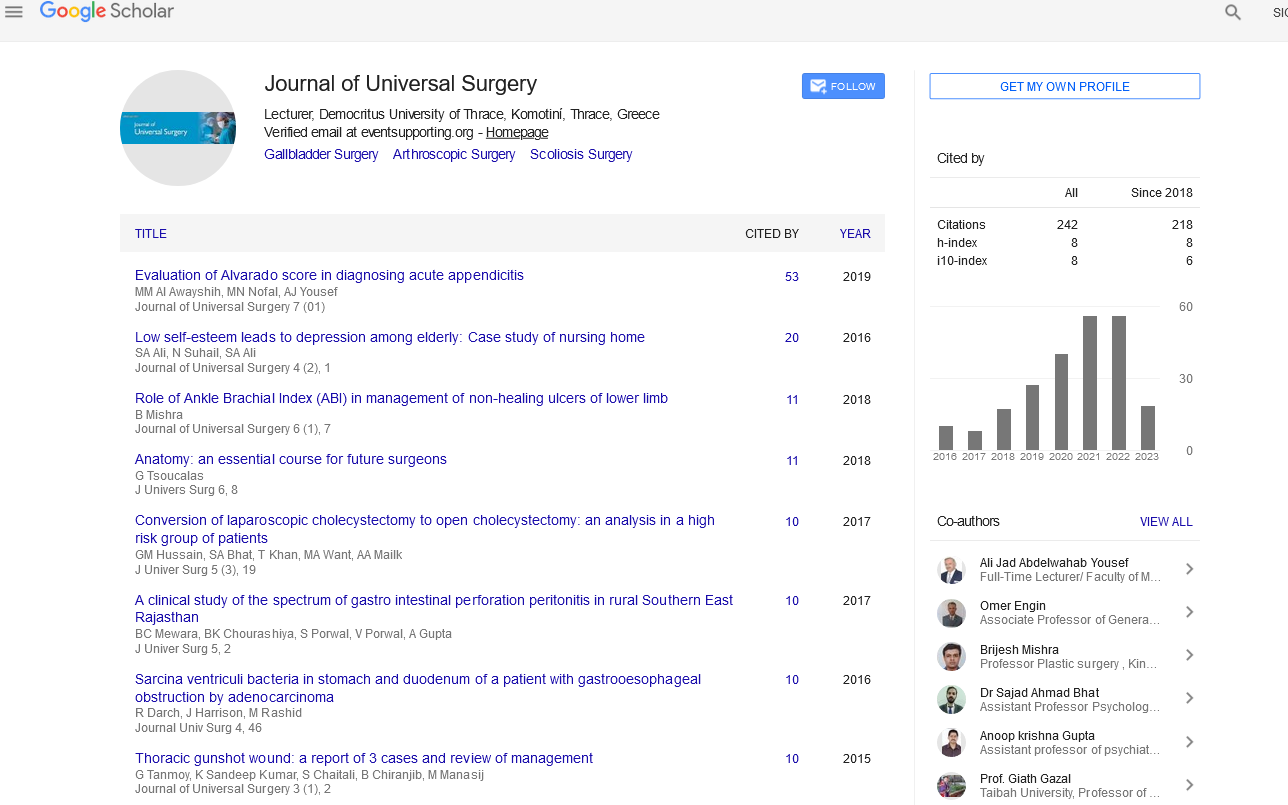Perspective - (2024) Volume 12, Issue 4
Criteria for Implant Surgery: A Comprehensive Guide
Muroien Legosie*
Department of Implantology, University of Izamal, Izamal, Mexico
*Correspondence:
Muroien Legosie, Department of Implantology, University of Izamal, Izamal,
Mexico,
Email:
Received: 04-Jul-2024, Manuscript No. IPJUS-24-15029;
Editor assigned: 09-Jul-2024, Pre QC No. IPJUS-24-15029 (PQ);
Reviewed: 23-Jul-2024, QC No. IPJUS-24-15029;
Revised: 01-Aug-2024, Manuscript No. IPJUS-24-15029 (R);
Published:
29-Aug-2024
Introduction
Implant surgery, a pivotal aspect of modern medicine,
encompasses various procedures aimed at replacing or
augmenting biological structures with artificial implants. The
criteria for implant surgery are multifaceted, involving patient
health, specific medical conditions and the type of implant. This
article delves into the diverse criteria for different types of
implant surgeries, exploring their indications, contraindications
and the decision-making process involved.
Description
Dental implants
Indications: Dental implants are recommended for patients
with missing teeth who desire a permanent solution. Indications
include:
Contraindications: Certain conditions may preclude patients
from receiving dental implants, such as:
Patient evaluation: A thorough evaluation is necessary to
determine candidacy for dental implants.
Orthopedic implants
Indications: Orthopedic implants are used to replace or
support damaged joints and bones. Common indications
include:
Contraindications: Certain conditions may limit the use of
orthopedic implants.
Cochlear implants
Indications: Cochlear implants are indicated for individuals
with severe to profound hearing loss. Specific criteria include:
Contraindications: Certain conditions may disqualify a patient
from cochlear implantation.
Cardiovascular complications: Scoliosis surgery in older adults
carries an increased risk of cardiovascular complications. The
stress of surgery and anesthesia can exacerbate pre-existing
cardiovascular conditions, such as hypertension, coronary artery disease and heart failure. Potential complications include
myocardial infarction (heart attack), arrhythmias (irregular
heartbeats) and thromboembolic events (blood clots).
Cardiovascular complications can be life-threatening and require
intensive medical management.
Breast implants
Indications: Breast implants are commonly used for cosmetic
augmentation or reconstructive purposes.
Contraindications: Certain factors may contraindicate breast
implant surgery.
Cardiac implants
Indications: Cardiac implants, such as pacemakers and
defibrillators, are used to manage arrhythmias and heart failure.
Contraindications: Certain conditions may limit the use of
cardiac implants.
Patient evaluation: Evaluation involves comprehensive
cardiological assessments.
Spinal implants
Indications: Spinal implants are used to stabilize the spine and
relieve pain from various conditions.
Contraindications: Certain factors may contraindicate spinal
implants.
Penile implants
Indications: Penile implants are used to treat erectile
dysfunction when other treatments fail.
Contraindications: Certain factors may limit the use of penile
implants.
Conclusion
Implant surgery, with its diverse applications, requires careful
consideration of various criteria to ensure successful outcomes.
A thorough evaluation of indications, contraindications and patient-specific factors is essential in the decision-making
process. By adopting a multidisciplinary approach and involving
patients in their care, healthcare providers can optimize the
benefits of implant surgery, enhancing the quality of life for
many individuals.
Citation: Legosie M (2024) Criteria for Implant Surgery: A Comprehensive Guide. J Univ Surg Vol.12 No.4: 038.





